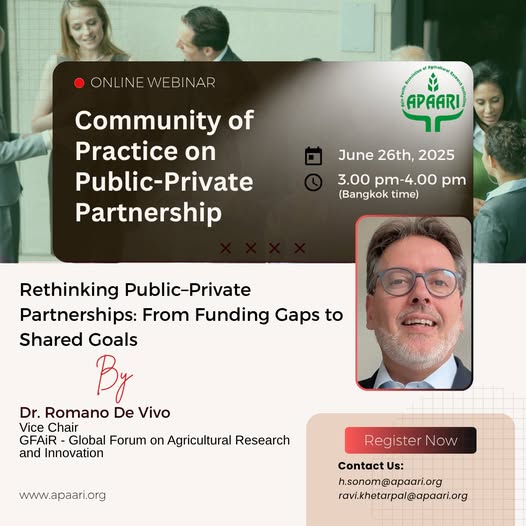26 June 2025. Rethinking Public–Private Partnerships: From Funding Gaps to Shared Goals
Second session of the APAARI Community of Practice on Public-Private Partnerships (PPP CoP)—a platform dedicated to strengthening public-private collaborations to enhance agricultural trade.
- Dr. Romano De Vivo, Vice Chair, GFAiR – Global Forum on Agricultural Research and Innovation
Dr. Romano De Vivo emphasized the vital role of public-private partnerships (PPPs) in agriculture and sustainable development, highlighting their global significance in mobilizing over $100 billion annually. These partnerships are endorsed by major institutions and UN frameworks such as the SDGs and Rio Conventions, underscoring their relevance for climate resilience and inclusive development. However, he insisted that true partnerships go beyond mere transactions or sponsorships—they must be grounded in co-design, shared purpose, and trust. Partnerships should not involve unilateral control or outsourcing, but rather mutual ownership and co-creation of solutions, where both public and private sectors contribute equally and align their objectives.
A successful partnership requires shared values, early engagement, and balanced responsibilities. Partnerships often fail due to unclear objectives, mismatched timelines, incompatible success metrics, and rigid contracts. While the public sector tends to prioritize implementation and short-term goals, the private sector focuses on long-term impact and financial returns. These differences, unless reconciled, lead to mistrust. Effective collaboration requires transparent governance, aligned KPIs, and careful consideration of reputational risks—especially when involving multinational corporations or local startups. The public sector must not compromise its mission but rather ensure that partnerships serve community needs and public interest first.
In closing, Dr. Romano De Vivo urged public institutions—especially National Agricultural Research Systems (NARS) and regional fora—to explore new roles as service providers and facilitators for the private sector. Given their deep understanding of local contexts, networks, and regulatory environments, public entities can guide private actors through complex local challenges, such as benefit-sharing or sustainability disclosure requirements. He encouraged reexamining foundational frameworks—like GFAiR’s own partnership principles—as a guide to forming high-impact, locally grounded, and ethically sound partnerships. Ultimately, the goal is to build models that are context-specific but anchored in strategic alignment, shared benefits, and lasting impact.
Background
What is the APAARI PPP CoP?
- A dedicated forum by APAARI to foster public–private partnerships focused on advancing agri‑trade in the Asia‑Pacific region
- Engages a wide mix of stakeholders: government (e.g., Department of Agricultural Extension, Bangladesh), private sector, NGOs, universities, and research institutions
- Designed to cultivate ongoing knowledge-sharing, joint problem-solving, and policy dialogue.
Launch & Key Sessions
- The inaugural event, held ~4 months ago, attracted 80+ participants from 9 countries, with a focus on Bangladesh
- February 24, 2025 session brought together experts and stakeholders for a targeted discussion on agri‑trade partnerships
Objectives and Outcomes
- Expert Insights & Perspectives
- Panel sessions featuring voices from APAARI, government (e.g., DAE), and private agribusiness investors to shape PPP roles in agricultural trade
Identifying Challenges & Opportunities
- In-depth discussions on trade compliance, policy advocacy, standards harmonization, and private‑sector engagement
- Commitment to Continued Engagement
- Participants agreed to hold regular CoP meetings to sustain momentum and collaboration
Contextual Linkages
- Builds on related APAARI initiatives such as the seed‑trade PPP project, focusing on phytosanitary compliance and private‑public collaboration in countries like Bangladesh, Cambodia, Nepal, Thailand,
- Reinforces APAARI’s broader initiative to strengthen agricultural innovation systems and capacity development across the region.
Why It Matters
- Serves as a bridging mechanism between policy-makers, agribusiness, research, and farmers to unlock new trade opportunities.
- Addresses key bottlenecks—such as compliance and market access—through collective action.
- Supports APAARI's mission to enhance agri‑trade, sustainability, and innovation via multi-stakeholder platforms.
Moving Forward
- Regular sessions are planned across different member countries to share successful PPP models, align policy frameworks, and facilitate on‑the‑ground collaboration.
- Through this CoP, APAARI aims to build scalable, repeatable PPP models that enhance agriculture trade and market access throughout the region.

